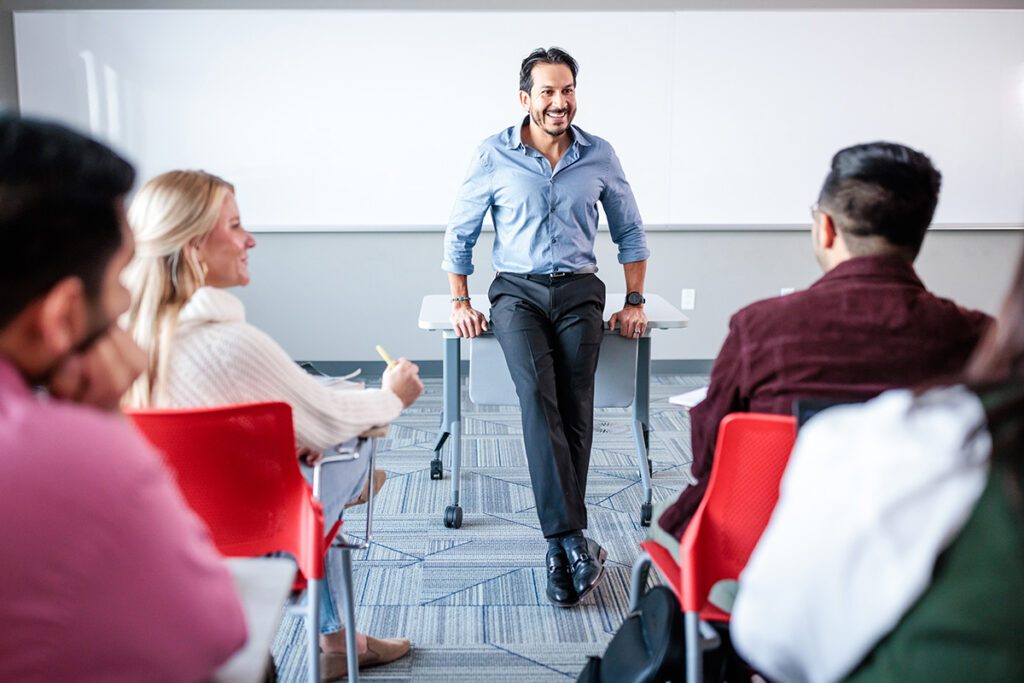Jon Padia is shaping future dietitians and challenging the status quo, breaking cultural barriers in dietetics and empowering interns to become advocates for change. His journey is a testament to the transformative power of education and the pursuit of a healthier, more inclusive future. Padia, a former rodeo cowboy, encourages other changemakers with a common rodeo phrase: “You’re never ready — it just happens to be your turn.”

As Dietetics-internship director at Metropolitan State University of Denver, Padia, a registered dietitian, supports students as they complete 1,200 hours of work in their clinical and community internship before taking their national Registered Dietitian exam.
Although the Academy of Nutrition and Dietetics requires the internship, Padia sees it as an opportunity to expose students to diverse thoughts and experiences. “In the dietitian realm, the demographic is 98% white women,” he said. “But so much of food and nutrition is connected to family and cultural traditions. We can’t help people if we don’t understand where they come from.”
Padia sees internships as a way to expand students’ awareness of other cultures and lifestyles, making them more inclusive and open-minded dietitians. “A good example is there’s a common view that the Mediterranean diet is the ultimate healthy diet, but what if your culture doesn’t eat that way?” Padia said. “A Hispanic diet also has vegetables and lean fish such as ceviche, for example, and can be very healthy. A diverse outlook allows more dietitians to incorporate healthy foods of any culture.”

Rooted in Aurarian history
Born in Denver, Padia is a fourth-generation Coloradan and grandchild of displaced Aurarians. “My grandfather and father lived across the street from St. Cajetan — the tree in his front yard is still on campus,” Padia said. “My mom’s parents lived across the street from my grandparents before she was born.”
Using his Displaced Aurarian Scholarship, Padia received his Bachelor of Science in Dietetics from MSU Denver in 2013 and his Master of Science in Food Science and Nutrition from Colorado State University in 2018. After earning his master’s degree, Padia stayed engaged by volunteering with MSU Denver as a mentor to Dietetics students. “I always find myself coming back to this amazing university,” he said. He made his return official when he took on the role of internship director this past summer.
School lunch: serving complexity
As a mentor to future dietitians and policymakers, Padia is especially passionate about the potential impact that Department of Nutrition graduates can make on school nutrition programs. “I hope they can change people’s perception of public-school meals,” he said. “Did you know that 98% of Denver public schools have a salad bar?”
Padia did his master’s thesis on plate-waste studies in the National School Lunch Program. He also worked as a dietitian for a local school district, the Special Supplemental Nutrition Program for Women, Infants and Children and the Colorado Department of Education, where he led menu planning in school nutrition programs.
While pleased with how far school lunch has come in terms of healthfulness and accessibility, Padia recognizes more can be done. He wishes people knew that nutritional changes in schools are incredibly complicated. “As an example, the amount of time that kids have to eat is beyond the purview of any food program,” Padia said. “That’s the realm of the National Department of Education. One way school food programs adapted is to purchase food that comes in plastic containers so it’s easier to eat quickly. I wish people would educate themselves on how these decisions are made and the reasons behind them.”
Ensuring that the interns in his program are informed, Padia is taking them to the state Capitol in Denver in March to learn about bill sponsors and lobbyists and how they can make policy changes. “I hope they take what they learn and feel empowered to make a difference as they go out into the world to work,” he said.
MSU Denver Dietetics student Natalie Ramos received firsthand experience with food policy while completing her internship hours. Her first rotation was with the Douglas County School District in food service, where she learned about nutrition policy and school food programs. “Because of my internship, I feel confident in my abilities and believe I have the potential to create an impact and make change happen within the realm of nutrition and dietetics,” she said.
At the forefront of a changing city
Working on the campus that stands where his father grew up, Padia understands how rapidly Denver is transforming. He’s glad MSU Denver is at the forefront of the shift. “By serving our population of students and doing it well, MSU Denver is changing the city,” Padia said. “Many of our graduates are hired in health care and hospitals. They’re going out with their expanded awareness of different cultures and improving dietetic outcomes. Everyone knows the MSU Denver interns and has given good feedback on them.”
To the interns in his program, Padia suggests a proactive approach to effecting positive change. “You’ll never be 100% motivated or ready,” he said. “Immerse yourself in volunteering, networking and learning by doing and then just get started.”
Editor’s note
Throughout the year, RED’s Changemakers series will feature students, faculty members, staff members and alumni who are trailblazers for Colorado’s success and active citizens paying it forward in their communities. Are you (or is someone you know) a Changemaker?

